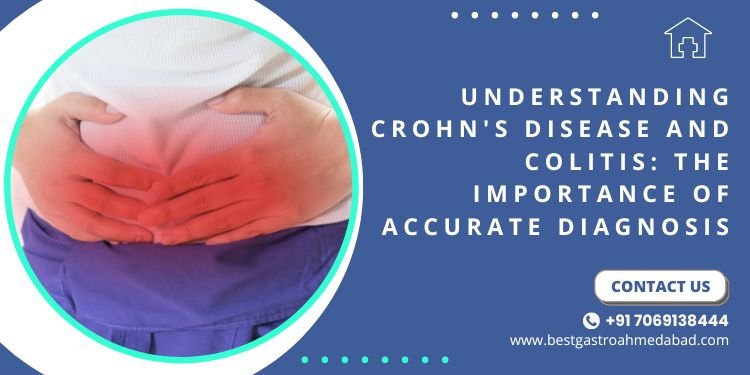Crohn’s Disease vs. Colitis: How to Ensure the Right Diagnosis

Why Accurate Diagnosis is Key in Managing Crohn’s Disease and Colitis
When it comes to managing chronic conditions like Crohn’s Disease and Ulcerative Colitis, an accurate diagnosis is not just important—it’s essential. These inflammatory bowel diseases (IBDs) share similar symptoms, making it challenging to distinguish between them without a thorough evaluation. Misdiagnosis can lead to inappropriate treatment plans, worsening of symptoms, and potential complications.
Understanding Crohn’s Disease and Colitis
Crohn’s Disease and Ulcerative Colitis are both types of IBD, but they affect different parts of the digestive tract. Crohn’s Disease can impact any part of the gastrointestinal tract from the mouth to the anus, often penetrating deep into the bowel tissue. In contrast, Ulcerative Colitis is limited to the colon and rectum, primarily affecting the innermost lining of the colon.
Despite their differences, the symptoms of these two conditions can overlap significantly. Common symptoms include abdominal pain, diarrhea, fatigue, and weight loss. This overlap makes accurate diagnosis challenging yet vital for effective treatment.
The Importance of Accurate Diagnosis
A precise diagnosis is the foundation of effective treatment for Crohn’s Disease and Colitis. Without it, treatment plans may not target the specific nature of the condition, leading to ineffective management and possible complications. For example, treatments that are effective for Ulcerative Colitis may not be suitable for Crohn’s Disease and vice versa. This can result in ongoing symptoms, unnecessary side effects, and a reduced quality of life for the patient.
Diagnostic Techniques
Diagnosing Crohn’s Disease and Colitis involves a combination of clinical evaluations, laboratory tests, imaging studies, and endoscopic procedures. Dr. Vatsal Mehta, a leading gastroenterologist in Ahmedabad, Gujarat, emphasizes the importance of a comprehensive diagnostic approach.
- Clinical Evaluation: A detailed patient history and physical examination help identify symptoms and potential risk factors.
- Laboratory Tests: Blood and stool tests can detect inflammation and infection markers, which provide clues about the condition.
- Imaging Studies: Techniques such as MRI, CT scans, and ultrasounds offer detailed views of the digestive tract, helping to identify areas of inflammation or other abnormalities.
- Endoscopic Procedures: Colonoscopy and upper endoscopy allow direct visualization of the digestive tract and enable tissue biopsy for further analysis.
Personalized Treatment Plans
Once a precise diagnosis is established, a personalized treatment plan can be developed. This may include medication, dietary modifications, lifestyle changes, and, in some cases, surgery. The goal is to reduce inflammation, manage symptoms, and improve the patient’s overall quality of life.
Dr. Vatsal Mehta tailors each treatment plan to the specific needs of his patients, ensuring that they receive the most effective care possible. By focusing on accurate diagnosis, Dr. Mehta helps patients achieve better long-term outcomes and a higher quality of life.
Conclusion
Crohn’s Disease and Colitis are complex conditions that require a nuanced and accurate diagnosis for effective management. Misdiagnosis can lead to inappropriate treatment, prolonged symptoms, and unnecessary complications. Dr. Vatsal Mehta, a highly regarded gastroenterologist in Ahmedabad, Gujarat, is dedicated to providing precise diagnosis and personalized treatment for his patients. By doing so, he helps them navigate their condition more effectively and live healthier, more fulfilling lives.
If you or a loved one is experiencing symptoms of Crohn’s Disease or Colitis, don’t hesitate to seek professional medical advice. Early and accurate diagnosis is the key to effective treatment and better health outcomes.
